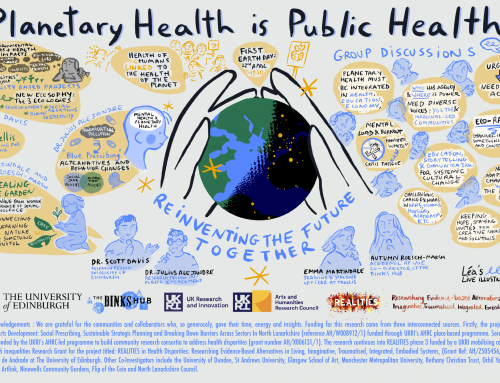Harnessing Nature for Recovery:
A collaboration with Ninewells Community Garden

Chris Lim, Senior Lecturer in Design and Making
Duncan of Jordanstone College of Art & Design, University of Dundee
As part of REALITIES, Ninewells Community Garden is developing a nature-based activities programme aimed at supporting people in recovery in partnership with academics, particularly a transdisciplinary team at the University of Dundee.
Located within a 18th century arboretum on the grounds of Ninewells hospital in Dundee, Ninewells Community Garden (NCG) is a volunteers-led initiative that has been serving the community for over a decade.
The idea of a community garden started in 2013 when the NHS decided to make the arboretum more accessible to the public by creating footpaths. This inspired hospital staff and community volunteers and together with the charity Trellis, they began to develop part of the arboretum to include a garden.

Additional support came from BBC’s Beechgrove Garden, a local school, nursery and charities. In 2016, funding by the forestry Commission Scotland and the Community Innovation Fund enabled the construction of the Leaf Room – a sheltered space that serves as a meeting or workshop area for visitors and volunteers.
In the last 12 years, NCG has been actively serving the community offering nature-based and creative activities including gardening, horticulture, yoga and outdoor cooking sessions for people around the area and further afield. These activities are either volunteer-led, staff-supported or paid for by the donations the garden receives. NHS staff and health care professionals frequently use the space, either for their wellbeing or bringing patients to enjoy the garden.
There is growing research evidence pointing to the benefits of interacting with nature. Spending time in green spaces can help combat health issues, and enhance physical, mental and social wellbeing. Being physical either through walking, or gardening can not only lower coronary heart disease, it can help improve sleep quality, cognitive and immune function. Looking at greenery and flowers, listening to bird sounds or running water, smelling the earthy aroma of fallen leaves, touching the bark of trees and generally being in a peaceful, and beautiful space can reduce stress and promote relaxation. Being in nature and experiencing it with others also provides opportunities for social interaction and encourages connectedness.
As a community asset, NCG play an important role in providing community-based opportunities to enhance an individual’s health and wellbeing – whether its mental, physical or social, providing civic engagement opportunities for the individual. As part of REALITES, we are interested in exploring how NCG can support the recovery of people who use drugs and who may experience homelessness through nature-based activities. Research has shown that recovery is a socially mediated process and the opportunity to move away from an ’addict’ to a ‘recovery’ identity provides encouragement and support during their recovery journey.
A key idea in this journey is recovery capital which consist of personal, social and community capital. Personal capital refers to the skills, personal resources, aspirations and hopes that an individual can draw upon to thrive. Social capital is the social network that an individual has or might form in future that will provide nurturing of supportive relationships. Community capital is activities, transport links, facilities as well as the attitudes, values and beliefs held by the community.
 Using these ideas, NCG’s community engagement facilitator and academic researchers created a six-weeks programme proposal to give people an overview of gardening skills and participate in nature-based craft and exercise activities. To ensure the appropriateness of the programme, we held three ‘taster sessions’ with a range of stakeholders in Dundee who work with people in recovery including primary care link workers, mobile dental health nurses, Royal Society for the Protection of Birds (RSPB) community engagement officer and recovery support workers. A total of 18 stakeholders took part in the taster sessions where they toured the garden, participated in a craft activity followed by focus group discussion sessions to provide feedback on the six weeks programme. We are analysing the feedback and cannot wait to share the revised six weeks programme with our stakeholders soon.
Using these ideas, NCG’s community engagement facilitator and academic researchers created a six-weeks programme proposal to give people an overview of gardening skills and participate in nature-based craft and exercise activities. To ensure the appropriateness of the programme, we held three ‘taster sessions’ with a range of stakeholders in Dundee who work with people in recovery including primary care link workers, mobile dental health nurses, Royal Society for the Protection of Birds (RSPB) community engagement officer and recovery support workers. A total of 18 stakeholders took part in the taster sessions where they toured the garden, participated in a craft activity followed by focus group discussion sessions to provide feedback on the six weeks programme. We are analysing the feedback and cannot wait to share the revised six weeks programme with our stakeholders soon.
By harnessing the healing powers of nature, we hope to create a sustainable, community-driven initiative that empowers people in recovery, helping them build their health, confidence and connections. Stay tuned…..





